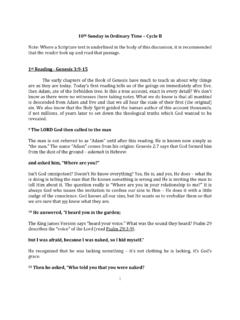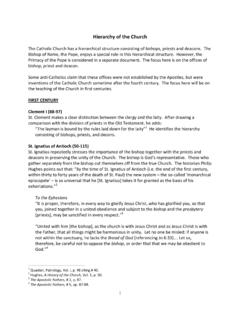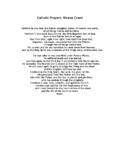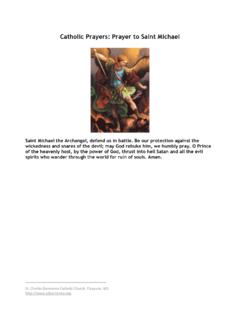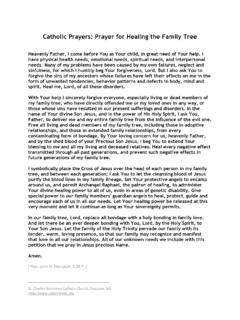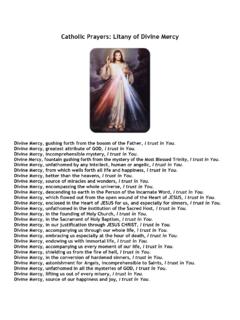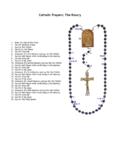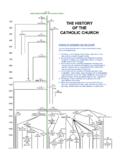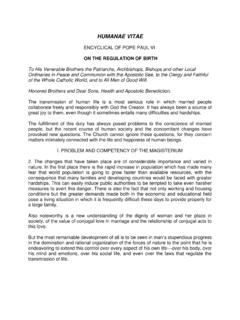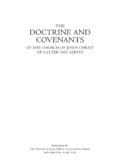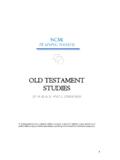Transcription of 21st Sunday in Ordinary Time - Cycle B - Charles …
1 1 21st Sunday in Ordinary time Cycle B Note: Where a Scripture text is underlined in the body of this discussion, it is recommended that the reader look up and read that passage. 1st Reading - Joshua 24:1-2a, 15-17, 18b Joshua is the sixth book of the Old Testament and is named after the one to whom Jewish tradition attributes authorship. However, as we presently have it, it cannot be entirely his work as some passages point to events which occurred at a later date. Joshua (Greek: Jesus, Hebrew: Yeshua) was the person designated by Moses to succeed him in the governing of Israel. Moses passed all his authority on to Joshua, with the exception of his priestly powers, which went to Eleazar.
2 Joshua (the name means Yahweh is salvation) had his name changed from Hoshea (salvation) by Moses (Numbers 13:16). It was Joshua who led the Hebrews to victory over the Amalekites while Moses prayed (Exodus 17:8-16). He was elected as the tribe of Ephriam s representative in the group of 12 sent to reconnoiter the land of Canaan (Numbers 13:8). He and Caleb are the only people who were over the age of 20 when the Jews left Egypt who lived to enter the promised land; all the rest died in punishment for their infidelity (Numbers 14:30-38; 31:26-65; 32:13). The book of Joshua falls naturally into two parts: 1) The crossing of the Jordan, the fall of Jericho, and the conquest of Palestine (Chapters 1 through 12); and 2) The division of the lands (Chapters 13 through 24).
3 Today s reading comes from the last chapter of the book where Joshua addresses the people assembled at Shechem on the subject of fidelity to God s law. 24:1 Joshua gathered together all the tribes of Israel at Shechem, The name Shechem means shoulders because of its location between the shoulders of Mt. Ebal to the northwest and Mt. Gerizim to the southwest. The shrine there may have contained the Ark of the Covenant but it is not clear. summoning their elders, their leaders, their judges and their officers. When they stood in ranks before God, This is probably an allusion to the Ark of the Covenant.
4 2a Joshua addressed all the people: 15 If it does not please you to serve the LORD, decide today whom you will serve, 2 Choose A choice between Yahweh and other gods. the gods your fathers served beyond the River or the gods of the Amorites in whose country you are dwelling. Judges 1:1 through 3:6 tells us the Amorites still occupy most of the land. As for me and my household, we will serve the LORD. 16 But the people answered, Far be it from us to forsake the LORD for the service of other gods. 17 For it was the LORD, our God, who brought us and our fathers up out of the land of Egypt, out of a state of slavery.
5 He performed those great miracles before our very eyes and protected us along our entire journey and among all the peoples through whom we passed. 18b Therefore we also will serve the LORD, for he is our God. This affirmation expresses the essence of Israel as a confederation whose principle unity was religious: worship of Yahweh and Yahweh alone. They are a covenant people. 2nd Reading - Ephesians 5:21-32 This is our last reading from the letter to the Ephesians during Cycle B. During the past four weeks we have learned of the Call to Unity, Interior Renewal, Christian Virtues, and the Chaste Life of the Children of God.
6 This week we hear about Christian Family Life. The Apostle explores what being Christian means in the context of husband-wife relations and this is our subject for today. This teaching of Scripture has been the subject of much discussion of late; especially among the Southern Baptist Convention, which has recently adopted it as a rule of faith. Parent-child relations are addressed in 6:1-4 and are recommended reading. The supposition here is that both husband and wife are Christians (1 Peter 3:1-7 addresses the situation of a Christian wife and a pagan husband). 21 Be subordinate to one another out of reverence for Christ.
7 This saying announces a principle which is applied to relationships between husband and wife, parent and child, master and slave. Christ s self-sacrificing love for others (Ephesians 5:1) is now the model for home (and Christian) life. 22 Wives should be subordinate to their husbands as to the Lord. This is a new motivation. Relationships between Christians must be accompanied by a reverence for Christ s fellow members; after all, we are all members of the body of Christ (there is a parallel text in Colossians 3:18). The union of Christ and the Church is holy. So is the proper union of husband and wife holy.
8 Just as a congregation of heretics, however, cannot rightly be called the Church of 3 Christ and cannot have Christ as its head, so it is that the union between husband and wife cannot be truly called holy if there is a disregard for the way of life taught by Christ [Saint Jerome ( 436), Commentaries On The Epistle To The Ephesians, 5,22-23]. 23 For the husband is head of his wife just as Christ is head of the church, he himself the savior of the body. 24 As the church is subordinate to Christ, so wives should be subordinate to their husbands in everything. 25 Husbands, love your wives, even as Christ loved the church and handed himself over for her Christ gave Himself for others (Galatians 2:20; the parallel text is Colossians 3:19).
9 In these verses about wives and husbands the apostle has developed an analogy whereby husband represents Christ and wife represents church. This teaching has its roots in the Old Testament where the relationships between Yahweh and His people are expressed, through the preaching of the prophets, in terms of the relationships between husband and wife. The husband loves his wife truly, he is completely faithful to her (Hosea 1:3; Jeremiah 2:20; Ezekiel 16:1-34). God is forever faithful to the love He has shown Israel, and He is ever ready to pardon her (Isaiah 54:5-8; 62:4-5; Jeremiah 31:21-22) and to re-establish his Covenant with the people (Isaiah 16:5-63).
10 Jesus describes himself as the bridegroom (Matthew 9:15; John 3:27). He brings into being the New Covenant, which gives rise to the new people of God, the Church (Matthew 26:26-29). The relationship between Christ and the Church appears in the New Testament in terms of husband and wife. 26 to sanctify her, cleansing her by the bath of water with the word, 27 that he might present to himself the church in splendor, without spot or wrinkle or any such thing, that she might be holy and without blemish. By what word is she washed? In the name of the Father, and of the Son, and of the Holy Spirit. He did not simply bathe her; He adorned her, making her glorious, having no spot or wrinkle or anything lacking.
